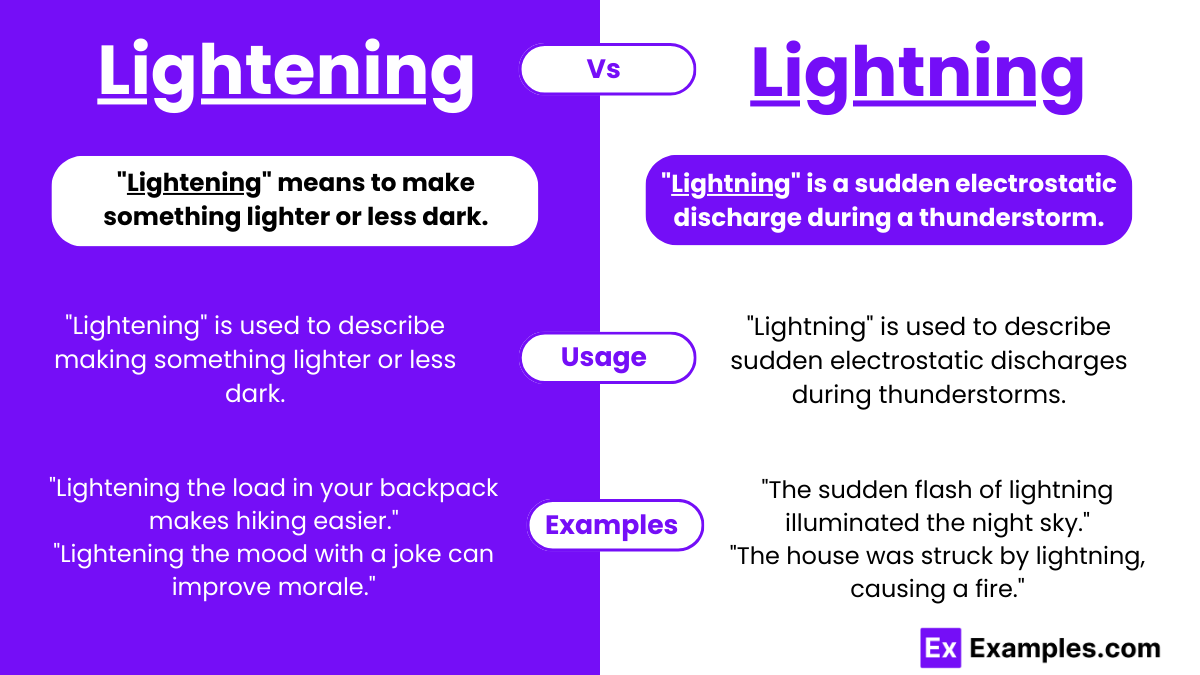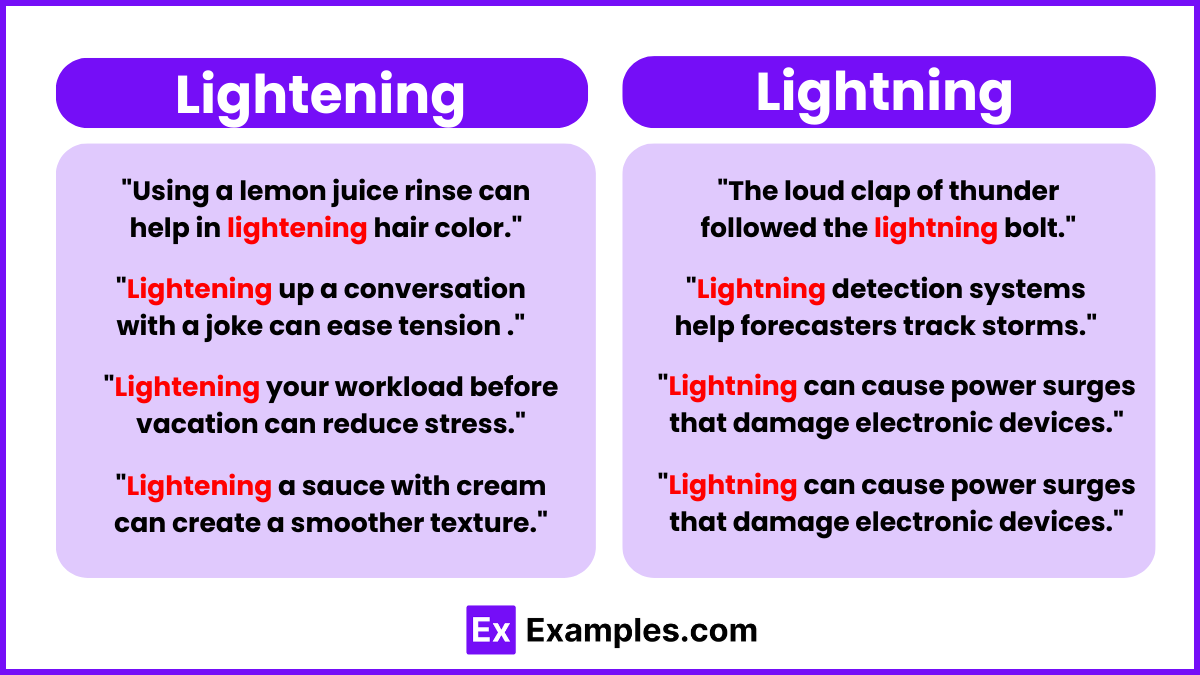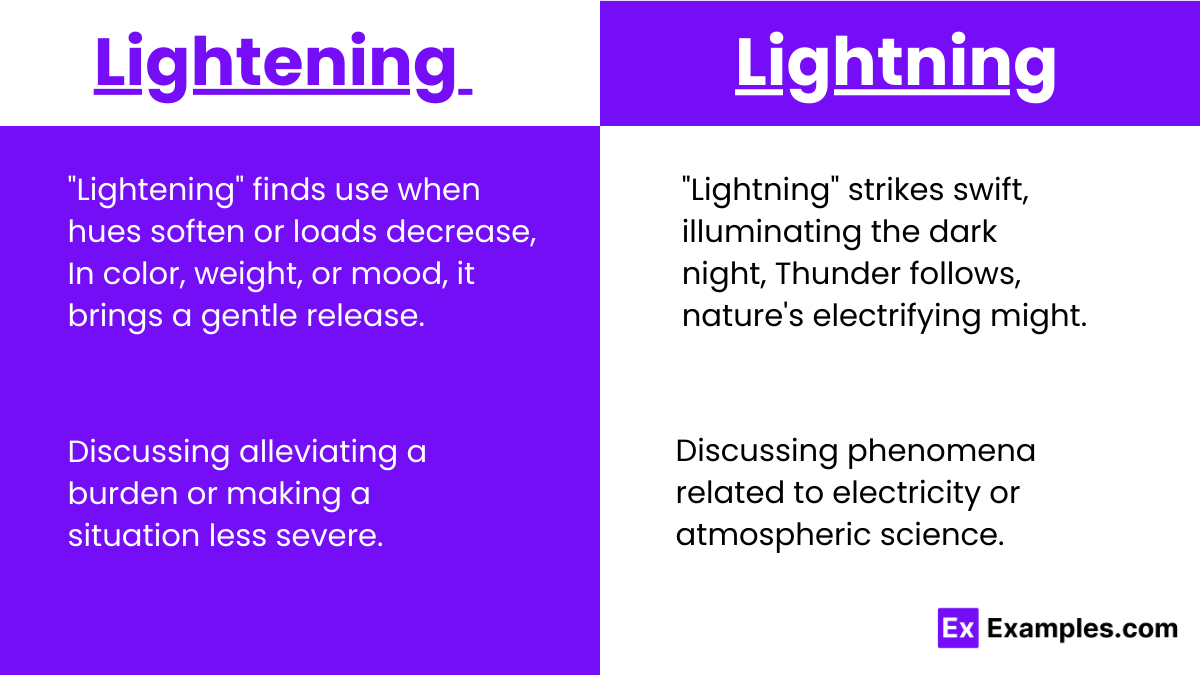Lightening vs Lightning
The realm of English homophones brings us to a fascinating pair: “lightening” and “lightning.” Despite their similar pronunciation, these terms illuminate vastly different concepts. On one hand, “lightening” speaks to the act of making something less heavy or more bright, often used metaphorically to describe easing burdens or adding brightness to one’s life. On the other, “lightning” captivates us with its raw power, describing the natural electrical phenomenon that streaks across the sky during storms, embodying speed and intensity in both the natural world and figurative language.
This linguistic twist, where a single letter change alters meaning so drastically, underscores the importance of precision in language. While “lightening” may bring to mind images of subtle transformations and gentle brightening, “lightning” evokes awe with its sudden brilliance and formidable energy. Exploring these terms not only enriches our vocabulary but also deepens our appreciation for the nuances that make English a complex and intriguing language.
Lightening and Lightning – Meanings
Lightening: The term “lightening” refers to the process of making something lighter or less dark. This can be applied in various contexts, including reducing the weight of an object, diminishing the severity or intensity of a situation, or making a color less intense. In a more specific medical context, “lightening” also describes the moment before childbirth when the baby moves lower into the mother’s pelvis, indicating preparation for labor.
Lightning: “Lightning” is a natural atmospheric phenomenon characterized by a sudden electrostatic discharge during a thunderstorm. This discharge leads to a bright flash of light, often followed by the sound of thunder. Lightning can occur between clouds, within a single cloud, or between a cloud and the ground. Beyond its meteorological definition, “lightning” is also used metaphorically to describe something incredibly fast or sudden, capturing the essence of the swift, striking nature of a lightning bolt.
Summary
The English language has evolved in such a way that words once spelled identically now bear different spellings and meanings. “Lightening,” with an ‘e,’ refers to the act of making something lighter in weight or color, akin to lightening one’s hair. Conversely, “lightning,” lacking the ‘e,’ denotes the electric flash seen in the sky during storms, and is metaphorically used to describe swift actions, evident in terms like “lightning round” in games and shows.
Difference Between Lightening and Lightning
Exploring the distinct nuances between “lightening” and “lightning” reveals the intricacies of English homophones.
| Aspect | Lightening | Lightning |
|---|---|---|
| Definition | Making something lighter or less heavy. | A natural electrical discharge in the atmosphere. |
| Usage | Describes reducing weight or brightness. | Refers to the rapid discharge of electricity. |
| Context | Often used in everyday language and beauty. | Primarily associated with weather and speed. |
| Phonetics | Pronounced with a softer “e” sound. | Pronounced with a striking “i” sound. |
| Physical Phenomenon | Does not refer to a physical natural event. | Describes an atmospheric event involving electricity. |
| Metaphorical Use | Rarely used metaphorically. | Commonly used to describe something fast or sudden. |
| Visual Imagery | Associated with softness and gradual change. | Evokes images of sudden brightness and power. |
| Linguistic Role | Acts as a verb or an adjective. | Primarily used as a noun. |
| Related Terms | Lighten, lightened. | Thunder, storm, electrifying. |
| Memory Trick | Think of easing or reducing (‘e’ for ease). | Imagine the swift strike that eliminates the ‘e’. |
Examples of Lightening and Lightning
Here are examples of “lightening” and “lightning” are:
Lightening Examples:
- Using a cream for lightening skin blemishes.
- Lightening the load in a backpack for an easier hike.
- A painter lightening the shade of blue on the canvas.
- The mood lightening at a party after a funny joke.
- The sky lightening just before dawn.
Lightning Examples:
- A lightning bolt striking a tree during a storm.
- Capturing the beauty of lightning in a photograph.
- The phenomenon of ball lightning inside a laboratory.
- Lightning causing a power outage in the neighborhood.
- A runner’s speed described as fast as lightning.
When to Use Lightening and Lightning
Understanding when to use “lightening” versus “lightning” is crucial for clear communication. Here’s a guide to their appropriate usage:
-
Usage of “Lightening”
- Referring to making something lighter or less heavy.
- Describing the process of reducing darkness or intensity of color.
- Discussing alleviating a burden or making a situation less severe.
- Talking about the medical term related to childbirth preparation.
-
Usage of “Lightning”
- Describing the natural electrical discharge during a storm.
- Referring to something that occurs very quickly or unexpectedly.
- Using metaphorically to describe speed, as in “fast as lightning.”
- Discussing phenomena related to electricity or atmospheric science.
Tips for Lightening and Lightning
Navigating the subtle yet significant differences between “lightening” and “lightning” can enhance your linguistic precision. Here are some tips to master their usage:
1. Context Clues: Pay attention to the context. If the subject is related to weight, brightness, or easing a burden, “lightening” is likely the correct choice. For natural phenomena or speed, think “lightning.”
2. Phonetics Focus: Remember the pronunciation of the ‘e’ in “lightening.” It’s slightly elongated, which can cue you to the concept of extending or expanding lightness or ease.
3. Visual Imagery: Associate “lightening” with images of fading colors or reducing weight and “lightning” with the vivid visuals of a stormy sky and rapid flashes.
4. Metaphorical Usage: Use “lightning” for describing something fast or instantaneous, like a quick decision or action. Reserve “lightening” for processes of reduction or alleviation.
5. Memory Tricks: Imagine a lightning bolt striking the ‘e’ out of “lightening” to leave “lightning,” tying the absence of ‘e’ to the electrical discharge.
By applying these tips, you’ll not only choose the right word but also enrich your language with nuanced understanding and precise expression.
FAQs
Why Do People Spell Lightning as Lightening?
People often confuse “lightning” with “lightening” due to their similar pronunciation. Misunderstanding arises when differentiating the electrical phenomenon (lightning) from the act of making something lighter (lightening).
Which Spelling Is Correct: Lightning or Lightening?
Both “lightning” and “lightening” are correct but serve distinct meanings. “Lightning” refers to the atmospheric electrical discharge, while “lightening” means making something lighter in weight or color.
Is That Lighting Up or Lightening Up?
The correct term is “lightening up,” which means to become brighter or less heavy. “Lighting up” typically refers to illuminating something with a light source.
Where Does Lightning Strike the Most?
Lightning strikes are most frequent in areas near the equator and in regions where warm, moist air meets colder air, such as in the tropical rainforests of Congo and Lake Maracaibo in Venezuela.
Where Does Lightning Strike the Most?
Lightning most commonly strikes in equatorial regions and places where warm and cold air masses collide, making Central Africa and the Venezuelan lake region particularly prone.





